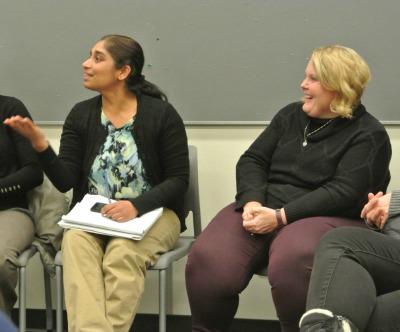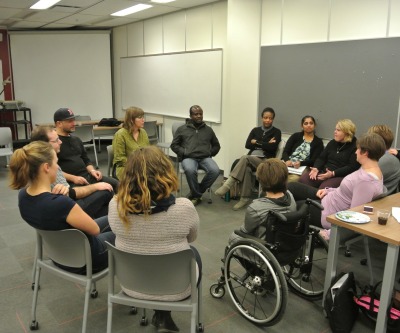Graduate students with diverse backgrounds have come together with a common goal of decolonizing adult learning.
The graduate course, Trends and Issues in Indigenous Adult Education, explores research, theory, and the practice of trends, issues, and perspectives in Indigenous learning.
Students from six countries were in the class from Brazil, Canada, Nigeria, Pakistan, South Africa and Sri Lanka. The diversity speaks to the higher number of international students who are choosing to further their studies at the University of Regina.
Having such a mix of backgrounds and viewpoints in one class made for some eye-opening perspectives on trends and issues involved in decolonizing adult learning in order to improve Indigenous education.
The class was led by Dr. Cindy Hanson, Associate Professor of Adult Education/Human Resource Development in the Faculty of Education.
“The class was important in this case because it was a coming together of international and Indigenous students in a very organic way and with a broad range of understandings regarding history, culture, and politics in Indigenous Adult Education,” says Hanson. “The course offered an opportunity to put this into practice. Experiences from the field of adult learning were built into the content.”
Many also feel little has been done to build structures and programs in communities for adult learning about decononization and Indigenous issues. They see this class as a good start. The students appreciated the participatory approach to Hanson’s class, allowing for discussions.

José Wellington Sousa is from Brazil and is working on his PhD in Adult Education at the U of R. He has earned a BA in Economics and a Masters of Science in Administration at the University of Amazonia in Brazil.
“The class was a great example of what is going on in Canada right now. I can see the diversity in the classroom. We can learn from each other. We had many nations and sharing and reflecting on Indigenous education,” says Sousa. “In Brazil, we are kind of behind in the discussions of decolonization. So we are not even talking about reconciliation and addressing the injustice. I see this class as an opportunity to understand and learn.”
Issah Gyimah, who earned his Bachelor of Education at the University of South Africa, grew up in the post-Apartheid era. He’s taught in South Africa, South Korea, and Saudi Arabia. He started his studies at the U of R in September.
“Coming from Africa and knowing about Apartheid, colonization, and racism, I have learned a lot from here and this class,” says Gyimah. “It has changed my perspective on how I see things. This class is a good foundation.”
Gyimah points out that adult education in South Africa is a growing area and a field that is not completely developed.
“We’ve been looking at children, but adults have influence on the children. There is a backlog of adults who did not get an education so this has left a big gap in South Africa,” he says.

Pauline Copland earned her Education Degree from Arctic College in Nunavut. She’s working towards her masters in curriculum and instruction at the U of R. Her first language is Inuktikut.
“From the readings and talking to my classmates, I learned things about our Canadian history, even my own history, like residential schools. It affected who I am without knowing,” says Copland, who appreciates the class diversity. “Compared to where I went to school, coming here looks like the whole world is here. The diversity is really nice, meeting people from different countries.”
The class includes one student from Saskatchewan, who sees her experience and diverse views as an asset that will help her down the road.
Chantelle Renwick has a Business Degree from the U of R and a graduate diploma in teaching from New Zealand. It was her experience in New Zealand that started her passion for Indigenous education. She’s working on her masters in Indigenous Education.
“What we hear over and over is that colonization has happened in so many part of the world and that Indigenous people have been dealing with the loss of culture and language,” says Renwick, who is an instructor of Office Administration at Saskatchewan Polytechnic in Regina.
“You realize with such a diverse class the different history and different feelings and perspective that the adult learners bring to the classroom. You become more conscious about the impact colonization has on people.”
The final class December 5, in the presence of elder Alma Poitras, featured a discussion about what the students learned and how it could be applied to their workplace or personal lives.
The classes also featured speakers including elders, a speaker from the Office of the Treaty Commission, a Metis lawyer storyteller, a talk by the U of R’s James Daschuk author of Clearing The Plains, and a fieldtrip to the Royal Saskatchewan Museum led by curator Dr. Evelyn Siegfried.
“Decolonizing adult education is a current theme in the field of adult education and a critical perspective on how to do this with a range of learners is important,” says Hanson.
The University of Regina has enjoyed an increase of graduate students. As of the Fall 2017, 1,902 graduate students are furthering their studies at the University.
Follow us on social media